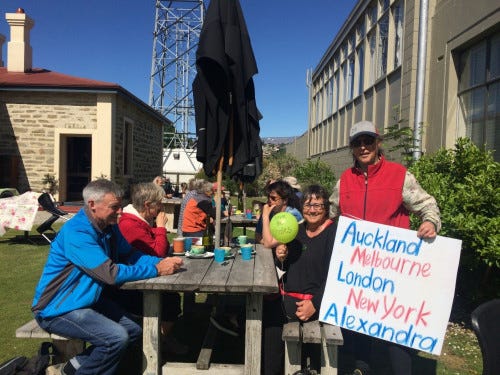Time to Make Climate Action Count
As published in the Mirror, and Stuff, Dec 2015
Tens of thousands of New Zealanders took to the streets last weekend to express their concern about climate change, and to show support for strong action at the Paris Sustainable Innovation forum (COP21). The action, part of a series of international marches co-ordinated by the environmental organisation 350.org, wasn’t confined to just the main centres. In Alexandra (population 5,000), where I was one of the march’s organisers, more than 125 people showed up at 9am on a Saturday to make their voices heard.

Intrepid marchers relaxing at the Courthouse Café in Alexandra.
The aim of 350.org is to ensure we leave our planet in good condition for our grandchildren. To do that, we need to limit the global temperature rise to no more than 2°C. To achieve that, we have to reduce the concentration of carbon dioxide in the atmosphere from its current level of 400 ppm to 350 ppm (hence 350.org) – still far above its pre-1950 level of 280 ppm. To meet the 350 ppm target, 80% of all the fossil fuel reserves that we know are still in the ground must stay there. To achieve that, we need to replace fossil fuels with renewables. And it needs to happen now.
On a per capita basis, New Zealand’s carbon footprint is among the world’s worst – it’s more than twice that of China, the world’s biggest polluter. Despite promises made in Kyoto, our net emissions soared by 42% between 1990 and 2013, second only to Turkey.
But we are well placed to make a difference. With over 70% of our electricity already from renewable sources, it would be easy to serve our remaining needs from solar energy without the need for any further capital investment from the government. The public will switch to solar anyway because the panels pay for themselves within a decade, but the transition needs to happen faster.
Any excess energy produced from small rooftop solar systems will go towards powering a new generation of electric vehicles that will inevitably replace the current fleet of petrol cars. Of course, multinational oil corporations such as Exxon Mobil will want to continue to slow down that transition, as they stand to lose billions. As recent reports have shown, they have known about the climate problem and its end-game for the last 25 years. But, rather than cut their profits, they instead responded with disinformation campaigns that have duped so many, stalling the needed transition. Unfortunately, our own government cannot escape similar conflicts of interest – it still owns 50% of our existing power stations, and it receives $800 million per year from oil and gas revenues.
Even with a strong commitment in Paris, the government will need mechanisms to implement it. A good place to start would be by shutting off subsidies for exploration and exploitation of fossil fuels. The government should also enforce a price on carbon, either via an Emissions Trading Scheme (ETS) or an emissions tax coupled with a credit for sequestration. Charging $50 per ton of carbon dioxide for all sectors of the economy would increase our petrol bills by $10 per 1,000 kilometres, but it would also provide a huge incentive to reforest the country. Together, these actions will simultaneously encourage smart personal choices, such as installing solar panels, insulating homes, or driving electric cars.
With the right attitude and commitment, we can ensure our grandchildren have a decent life on this planet, but we can’t continue down the path we’ve been treading. Last weekend, from Alexandra to Auckland, the people of New Zealand made their message clear: it’s time for serious climate action.


